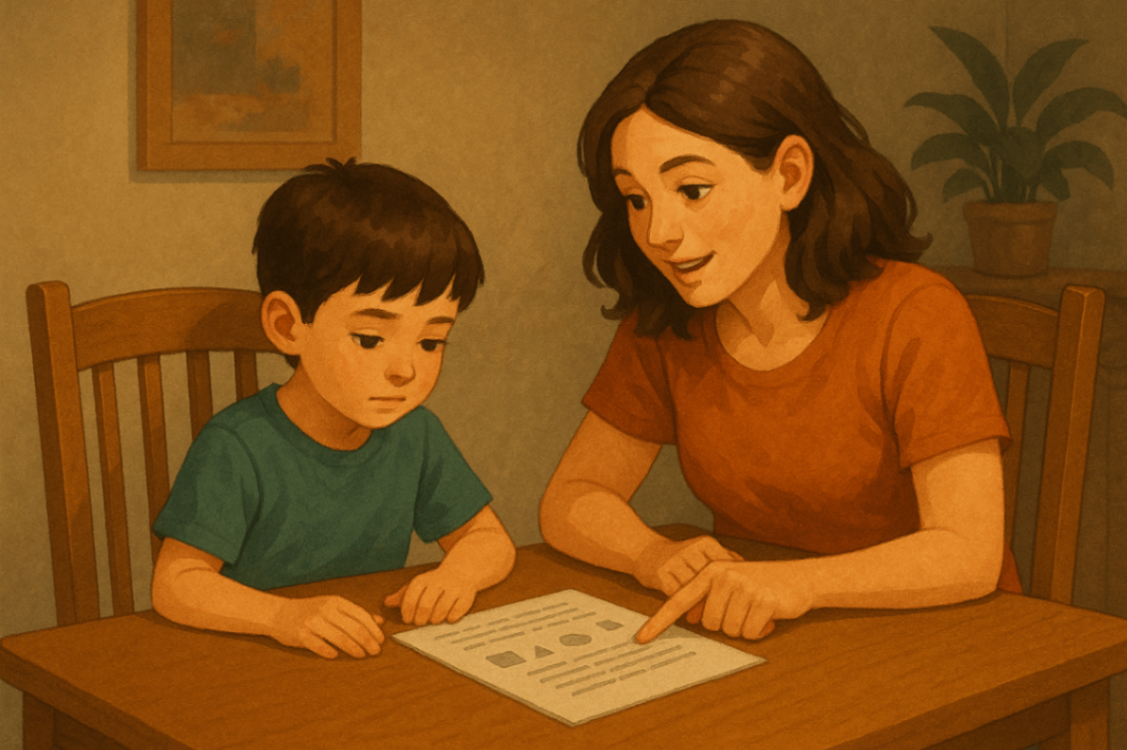
early intervention strategies: ndis behaviour support liverpool
22 July, 2025
Introduction
Starting early intervention for kids can change their lives for the better. With NDIS behaviour support that fits their needs—and the programs available through NDIS behaviour support Liverpool—families can help their children build strong skills as they grow. Support services use positive behaviour strategies to create environments where children can learn, grow, and become more independent. By addressing behaviour issues early with qualified ndis behaviour support practitioners, children get the chance to learn new skills and do their best. This article gives useful tips on how to access and use strong NDIS behaviour support strategies for children.
Key Highlights
-
Early intervention in Liverpool promotes positive behaviour and boosts life quality for children with support needs through tailored NDIS behaviour support.
-
NDIS behaviour support equips families with strategies for managing challenging behaviours effectively, delivered by skilled NDIS behaviour support practitioners.
-
Identifying early signs of behaviour concerns allows families to access necessary support services sooner via ndis behaviour support liverpool.
-
Experienced ndis behaviour support practitioners employ holistic methods to develop impactful behaviour support plans.
-
Families receive sustained assistance through every step of the NDIS behaviour support process.
-
Collaboration among professionals, support workers, and families ensures optimal outcomes for NDIS participants.
Understanding Early Intervention for Kids in Liverpool

Early intervention helps children in Liverpool meet their developmental needs early on, setting up the right conditions for positive behaviour through ndis behaviour support. It gives children the help they need to overcome challenges and thrive in learning and day-to-day environments.
Children with support needs or disabilities benefit greatly from early intervention. These strategies focus on communication, social skills, and self-confidence. When families access NDIS behaviour support Liverpool early, they see better developmental outcomes and gain tools to navigate future supports.
What is NDIS behaviour support and how does it work?
NDIS behaviour support is a tailored framework designed to assist individuals with disabilities in managing challenging behaviours. It involves creating personalized strategies and interventions to promote positive behaviour while ensuring the individual’s needs are met. This support enhances their quality of life and fosters independence within the community. Want to learn the fundamentals? Read What Is Positive Behaviour Support? A Guide for NDIS Families in Liverpool to understand the core principles and how they apply to your child.
Why Early Support Matters for Child Development
Providing early intervention is important for your child's future. It opens doors for positive change during the key times when your child is growing. When you address support needs early, you help your child get confidence, learn new skills, and connect better with people in their support network.
When you start early support, your child can deal with problems in a better way. This helps them to react well and build good social connections. These changes can make a big difference to how they do at school, with friends, and how independent they become as they grow.
Also, when you begin with early intervention, you start to build a strong support network for your family. It brings together support workers, teachers, and others to work on ways to support your child. When everyone works as a team, your child's needs are met and your family gets the help to make positive change each day. Looking for more hands-on tips? Check out our post on Functional Behaviour Assessments Explained: What Liverpool Families Can Expect to learn how to identify triggers and tailor supports for your child.
Recognising Early Signs of Behavioural Challenges
Noticing behavioural challenges in kids early is important. This helps you get help and support services fast. These signs often show the unmet needs of your child or the behaviours that cause worry. When you know what to look for, you can take steps at the right time.
Signs of concern may include:
-
Withdrawal or sudden emotional outbursts.
-
Difficulty following simple instructions.
-
Aggressive behaviour that disrupts social interactions.
-
Delays in communication skills or emotional regulation.
These issues may come from things like stress in the environment, being too sensitive to sounds or touch, or not having routines that work for your child. With early intervention, families get tools and support to face these challenges. This will help turn hard times into growing moments.
By keeping an eye out for these signs, you can help your child overcome problems. When you work with NDIS practitioners, your child can get the right support, build positive behaviour, and improve development.
Introduction to NDIS Behaviour Support
The National Disability Insurance Scheme (NDIS) gives easy-to-access behaviour support for children who have challenging behaviours. NDIS behaviour support plans are made just for each child. The focus is on what the child needs, so it is simpler for families to get the right support.
With the NDIS, children get help from both trained support workers and skilled staff. They all work together so your child can get all-around help. The goal is to help reduce behaviours of concern and also teach children new skills to help them become more independent. If you are a parent in Liverpool, you and your child can use the strong network of NDIS support services to meet your needs.
What is NDIS and How Does it Help Young Kids?
NDIS gives funding and sets up services that fit the needs of children with disabilities. Some of these kids need positive behaviour support. By meeting each child’s support needs, they can get better at talking with others, keeping their feelings in check, and learning social skills. They do this with planned help and positive behaviour support services.
The positive behaviour support offered by the scheme aims to help both families and their children. Practitioners and families work together. They find out what causes behaviours of concern and try to take away triggers. They also bring in different ways to respond. For example, when children have unmet needs, they look for ways to change their day or where they live to fix the problem for good.
The NDIS cares about each child’s inclusion and wants them to do well. The programs are built to help families guide their children and use better ways instead of challenging behaviours. This teamwork helps children be more independent and have a better quality of life.
Eligibility Criteria for NDIS Behaviour Support in Australia
The rules for getting NDIS behaviour support mean you must meet some points before you can get funds in your NDIS plan.
|
Eligibility Factors |
Details |
|---|---|
|
Permanent Disability |
You need to have a long-lasting disability. It must be serious enough, or you must need help to lower your support needs over time. |
|
Age |
You need to be under 65 years old. |
|
Location |
You must live in Australia. |
|
Citizenship |
You need to be an Australian citizen or have a permanent resident status. |
Parents can start the NDIS application using the NDIS Access Request Form. You can also get help straight from NDIS staff to make sure your child gets the behaviour support and other supports they need early. Unsure if your child needs help? Check out Signs Your Child May Benefit From Positive Behaviour Support for a handy checklist of early warning signals.
How to Access NDIS Behaviour Support in Liverpool

Getting NDIS behaviour support in Liverpool starts when you look at what your family needs and then apply through the NDIS. A behaviour support practitioner will help you each step of the way. They will work with you to make a support plan that fits your needs.
There are support workers and trained people close by who help make sure each child gets help early. Early intervention helps children most. The NDIS brings everyone together so that families, practitioners, and support teams can give children good care. Their work helps children become more independent, no matter what their support needs are. This teamwork helps NDIS behaviour support get to all who need it.
Navigating the Application Process for Families
Getting started with NDIS may seem hard at first, but help is there for you. Here is how to make this process easier:
-
Contact the NDIS by phone or by filling out their Access Request Form.
-
Gather all the right papers, like medical checks and proof of diagnosis.
-
Work with your chosen behaviour support practitioner to plan your first meeting.
-
Make a list of any questions or worries you want to talk about with the NDIS commission.
A good application shows your child’s support needs match what NDIS can give in funding. Working with a strong team helps make every step clear and easy to follow.
Choosing the Right Behaviour Support Provider
Selecting a provider is very important when you want to set up good behaviour support plans. Look for someone who meets the Positive Behaviour Support Capability Framework.
A good provider should show that they know a lot about behaviour strategies and give steady support. If the provider has a licence from the safeguards commission, it means they follow high standards. Also, it helps if the people working there use person-centred ways. That means they make plans just right for each person’s needs.
At daar, our team of accredited NDIS behaviour support practitioners meets the Positive Behaviour Support Capability Framework and holds licences from the NDIS Quality and Safeguards Commission—ensuring you receive the highest standards of care. We deliver person-centred plans tailored to each child’s unique needs and collaborate closely with families to achieve real, lasting change.
When choosing a provider, consider:
-
Expertise & Accreditation: Look for practitioners with proven experience in positive behaviour strategies and formal qualifications in NDIS behaviour support.
-
Local Service Reach: daar provides in-home and community-based NDIS behaviour support across a 15 km radius around Liverpool, including suburbs such as Casula, Moorebank, Prestons, Chipping Norton, Austral, Holsworthy, and Green Valley. Whether you’re in Edmondson Park, Warwick Farm, or Hinchinbrook, our NDIS behaviour support practitioners are just a short drive away—so help is always nearby.
-
Family Feedback: Read client testimonials to gauge consistency, communication, and outcomes.
Partnering with a trusted, locally based provider like daar creates a solid foundation—so your child benefits from proactive, high-quality NDIS behaviour support every step of the way. Ready to learn more? Contact Us to discuss your child’s needs and discover how our team can support your family’s journey.
Practical Early Intervention Strategies at Home
 Parents have a big part in helping with early intervention. Using positive behaviour support at home can help toddlers learn new skills, talk better, and get used to people and places.
Parents have a big part in helping with early intervention. Using positive behaviour support at home can help toddlers learn new skills, talk better, and get used to people and places.
When you work with your child’s support network, you can make fun things for your child to do that help them learn. Small changes to your day, where you live, and how you interact with your child can help toddlers grow and show more confidence. Trained NDIS workers can give you simple tools and positive behaviour support strategies that make it easier for your child to succeed.
Building Communication Skills in Toddlers
Helping children learn how to talk and share their needs is important. Using simple steps at home can make talking with others easier.
Here are some things you can do:
-
Help your child use words and body language while they play.
-
Show them pictures or use simple tools to help them understand.
-
Talk about daily routines often to build good ways to talk.
-
Praise your child when they speak well or share their thoughts.
These steps help toddlers get better at saying what they want. Support workers from the NDIS can also help by showing more ways for kids to grow their communication skills and keep learning new things.
Fostering Social and Emotional Development
Toddlers get a lot from simple social and emotional steps. Making their talks with others better can help cut down on feelings of being left out. It can also help toddlers work together in things they do every day.
Support workers help the kids learn to handle their feelings. They show ways to join in and get involved. Doing things with more than one step helps toddlers feel sure of themselves. It also helps them trust others. When kids have time to be with other toddlers, it helps them have more open minds and care about others, which is good for their mental health.
When parents use these ideas, the toddlers are more likely to have positive attitudes. This leads to good changes. It helps the kids get along better with others for life, and good for making friends, both one-on-one and in a group.
Collaborating with NDIS Behaviour Support Practitioners
Teamwork is important when you want to help change a child’s behaviour. NDIS practitioners put together support plans that help with unmet needs in a complete way.
This teamwork is not only about using certain ways to help. Family members also help by making rules and setting up things at home to encourage positive attitudes in toddlers. Practitioners give step-by-step help, so every part of the daily routine can lead to better behaviour. They also make sure to keep an eye on strict rules and keep children safe.
Conclusion
To sum up, early intervention is important for your toddler's healthy growth if they have behaviour problems. When you spot these early signs and use NDIS supports, you help your child build better communication and social skills. Using simple steps at home together with professional help can really help improve your child's life. The sooner you act, the better it will be for your child's long-term growth.
If you want to know more about how to use the NDIS or find the best behaviour support for your child, you can book a consultation with our experts today.
Frequently Asked Questions
How soon should I seek behaviour support for my child?
You should look for behaviour support for your child as soon as you see ongoing problems or delays in how they grow. Early intervention is a good way to help your child have better results. So, if you are worried about your child's behaviour, it is a good idea to talk to a professional right away.
What does a typical NDIS behaviour support plan include?
A standard NDIS behaviour support plan has several key parts. It usually starts with comprehensive assessments to learn more about the person and their behaviours. The plan gives steps that are made for each person to deal with certain behaviours. It shows ways to collect data, so you can track changes and see what works. There are also staff training guidelines to help people who work with the child do their best. The process gets reviewed often, so things can be changed when needed. The main aim of the behaviour support plan is to help make the child's quality of life better. It also tries to build a place where the child can feel safe and show more positive behaviours, with the right support all the way.
Can my child receive NDIS support before school age?
Yes, children can get NDIS support even before they start school. Early intervention is there to help if a child has a delay in development, or a disability. This support gives what a child needs in those key years when they are growing fast. To see if your child can get the help, there will be an assessment. This is done so the right amount of early intervention support is given based on what your child needs.
How can I prepare for my first NDIS planning meeting?
To get ready for your first NDIS planning meeting, start by collecting all important documents. Write down what your child needs. Set clear goals for your child. Bring in everyone who plays a big part in your child's life. Make a list of questions you want to ask, so you can talk about all the supports and services that will help your child. This will help make sure that the meeting covers everything your child needs.
Is NDIS behaviour support available for children with autism in Liverpool?
Yes, there is NDIS behaviour support for children with autism in Liverpool. Families can get help that fits what their child needs. Qualified staff work with you to help improve how your child acts. This support is there to help your child do better each day and to help them have good experiences with other people in the community.
.svg)

















